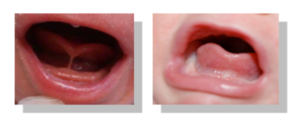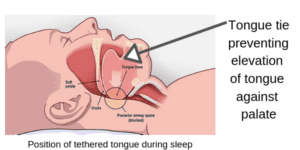Disclosure :: This post is sponsored by Lafayette Pediatric Dentistry and authored by Dr. Anita Gouri.
The Truth about Tongue and Lip-ties
What are tongue/lip ties?
An oral tie occurs when a small piece of tissue under the lip or tongue, known as a frenum, is attached in a poor position or is too tight/thick, causing restriction of tongue movement or lip flanging. Here are two examples of a tied tongue:
 In the first picture, the frenum is attached too anteriorly, at or near the tip of the tongue. In the second picture, the frenum is thick and posterior, and is commonly not diagnosed unless a provider elevates the baby’s tongue with their fingers.
In the first picture, the frenum is attached too anteriorly, at or near the tip of the tongue. In the second picture, the frenum is thick and posterior, and is commonly not diagnosed unless a provider elevates the baby’s tongue with their fingers.
Oral ties are common, and often restrictive. Talk of oral ties has now become more prevalent because awareness of the benefits of breastfeeding has risen. Oral ties can impede a baby’s ability to breastfeed properly, as the baby’s tongue cannot properly elevate and compress as needed to express breastmilk. The baby therefore cannot properly latch and instead “clamps” down on the mother with their lips, leading to painful and often arduous feeding sessions.
So my baby may have a tongue tie, but is bottle fed. Should I still be concerned?
Yes. The middle of the tongue, not just the tip, should naturally be able elevate towards the palate. When there is a tongue tie, the center of the tongue is literally “tethered” to the floor of the mouth and cannot elevate. As a result, several things may arise:
- As an infant: Proper swallow is affected. Excess air is ingested during feeds, clicking of the tongue can be heard, milk can leak out of the mouth, and feeds can be insufficient or prolonged in duration due to the baby having to “work harder” to overcome the restricted tongue. Additionally, milk residue often remains on the tongue instead of being cleansed off by the palate. These consequences can often mimic conditions like colic, reflux, and thrush.
- As a toddler/child: Similarly, poor tongue elevation can affect your toddler’s ability to transition to solid, chunkier foods. These children often gag more, drool more, and are diagnosed as picky eaters or as having food texture sensitivity. Speech is also affected, resulting in delays or difficulties with certain sounds.
- All ages: Improper orthodontic/skeletal development, sleep apnea: The tongue is the body’s natural Palatal Expander. The normal resting position of the tongue is against the palate, both during sleep and when awake. Since a tethered
 tongue cannot do this, the palate often remains high and narrow. This can lead to orthodontic crowding, and improper orofacial development. Narrow jaws lead to dental crowding, which in turn can lead to poor dental health, gum disease, TMJ disorders, frequent need for dental restorations, and/or recurrent orthodontic problems. When asleep, a tethered tongue that is supposed to rest against the palate, instead “falls’ backwards into the throat, leading to partial airway obstruction. Persons with tongue ties therefore can experience symptoms associated with sleep apnea, like frequent waking, restlessness, snoring, poor sleep quality, and grinding.
tongue cannot do this, the palate often remains high and narrow. This can lead to orthodontic crowding, and improper orofacial development. Narrow jaws lead to dental crowding, which in turn can lead to poor dental health, gum disease, TMJ disorders, frequent need for dental restorations, and/or recurrent orthodontic problems. When asleep, a tethered tongue that is supposed to rest against the palate, instead “falls’ backwards into the throat, leading to partial airway obstruction. Persons with tongue ties therefore can experience symptoms associated with sleep apnea, like frequent waking, restlessness, snoring, poor sleep quality, and grinding.
So it’s just a quick snip and that’s it?
The procedure itself can be done in an office setting, without general anesthesia, in less than 5 minutes with a laser and topical or local anesthetic. But the procedure is only a part of the puzzle and it is NOT a quick fix. As early as 20 weeks in-utero, a baby starts to use their tongue, but since the tongue is tied, it has no muscle memory for optimal feeding. Follow-up care with appropriate therapists who are trained in treating patients with tongue ties (speech/occupational/lactation) is critical to optimal success for your child. In addition, post-operative stretches and exercises of the tongue at regular intervals will be required to prevent reattachment. This applies regardless of age or whether the issue is feeding, speech, sleep apnea, or even an apparent lack of symptoms. The tongue needs to “learn” new movements, and the extra-oral muscles that have been overcompensating for the tethered tongue need to be re-trained.
How can Lafayette Pediatric Dentistry help me?
Dr. Anita Gouri has undergone extensive training in diagnosis and treatment of oral ties, as well as laser dentistry. She is a board certified pediatric dentist, member of the Academy of Laser Dentistry, and a suggested provider by the Louisiana Tongue Tie Support Group. She treats newborns to adolescents in her practice, including those with special needs. In keeping with the American Academy of Pediatric Dentistry’s guidelines, Dr. Gouri recommends all children establish a dental home no later than their first birthday, but strongly suggests an evaluation much earlier if you suspect your child has an oral tie or any feeding difficulties!
Learn more about Dr. Gouri and Lafayette Pediatric Dentistry::
Website | Facebook | Instagram | Twitter
 Dr. Anita Gouri, a pediatric dentist, has been practicing in Lafayette for 10 years and is the owner of Lafayette Pediatric Dentistry. She graduated from LSU School of Dentistry in 2006, receiving honors including Outstanding Achievement in Pediatric Dentistry, Honors in Research, and the Carl A. Baldridge Academic Scholarship. She completed her residency in pediatric dentistry at Children’s National Medical Center in Washington DC in 2008 and became a board certified diplomate of the American Board of Pediatric Dentistry in 2009. In 2010, her research on dental pain assessment was published in Pediatric Dentistry. She also has specialized training in treating babies and children who have tongue and lip ties. She is a member of the Academy of Laser Dentistry, American Academy of Pediatric Dentistry, the Louisiana Dental Association, the Southwestern Society of Pediatric Dentistry, American Dental Association, as well as the C. Edmund Kells and Omicron Kappa Upsilon Dental Honor Societies. Dr. Gouri, her husband, and their two children enjoy travel, Saints football, good food and good friends.
Dr. Anita Gouri, a pediatric dentist, has been practicing in Lafayette for 10 years and is the owner of Lafayette Pediatric Dentistry. She graduated from LSU School of Dentistry in 2006, receiving honors including Outstanding Achievement in Pediatric Dentistry, Honors in Research, and the Carl A. Baldridge Academic Scholarship. She completed her residency in pediatric dentistry at Children’s National Medical Center in Washington DC in 2008 and became a board certified diplomate of the American Board of Pediatric Dentistry in 2009. In 2010, her research on dental pain assessment was published in Pediatric Dentistry. She also has specialized training in treating babies and children who have tongue and lip ties. She is a member of the Academy of Laser Dentistry, American Academy of Pediatric Dentistry, the Louisiana Dental Association, the Southwestern Society of Pediatric Dentistry, American Dental Association, as well as the C. Edmund Kells and Omicron Kappa Upsilon Dental Honor Societies. Dr. Gouri, her husband, and their two children enjoy travel, Saints football, good food and good friends.


















